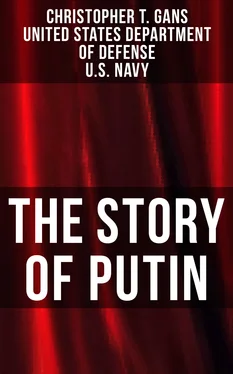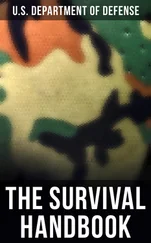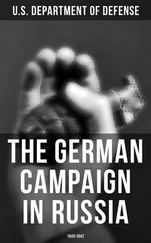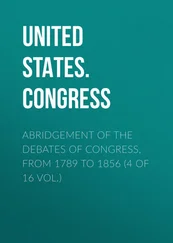Christopher T. Gans, United States Department of Defense, U.S. Navy
Published by

Books
- Advanced Digital Solutions & High-Quality eBook Formatting -
musaicumbooks@okpublishing.info
2020 OK Publishing
EAN 4064066394011
Table of Contents
I. PUTINIST AUTHORITARIANISM AND ANTI-AMERICANISM: AN INTRODUCTION I. PUTINIST AUTHORITARIANISM AND ANTI-AMERICANISM: AN INTRODUCTION Table of Contents
A. PURPOSE
B. IMPORTANCE
C. HYPOTHESIS AND THEORY
D. BACKGROUND
1. Putin’s Evolving Anti-Americanism
2. Putin’s Hybrid-Authoritarian Machine
3. Implications of Russians’ Anti-Americanism
E. METHODOLOGY AND SOURCES
F. ROADMAP
II. VLADIMIR PUTIN’S ANTI-AMERICANISM: OUTWARDLY FLUCTUATING BUT INTERNALLY CONSISTENT?
A. PUTIN’S EARLY HISTORY
1. Early Life and College
2. Into the Shadows: Putin in the KGB and the Case for a Long Term Cognitive Predisposition
B. YELTSIN ERA
1. Putin in the Aftermath of Collapse
2. Russia and the West in the 1990s: U.S. as an Inadvertent Contributor to Putinist Anti-Americanism
a. NATO
b. Balkans
c. Economic Collapse and the Absence of U.S. Aid
C. PUTIN: A SUDDEN THRUST INTO THE LIMELIGHT
1. Putin’s Short-Lived Premiership and Acting Presidency
a. Crisis in Chechnya
b. Presidential Election of 2000
D. PUTIN’S FIRST PRESIDENCY
1. Integrate Into or With the West… or Neither?
2. The Attacks of 9/11 and the Aftermath
3. Brotherly Love: Putin and Bush
4. Iraq and a Sudden Turn Against America?
5. Elections of 2003 and 2004
E. PUTIN’S SECOND PRESIDENCY
1. Shift from the West
2. America Inadvertently Plays into Putin’s Hand
a. NATO
b. The Future of U.S. Unilateralism
c. BMD
d. Western Turn by Former Constituent States
3. Critical Reciprocity? Attack on Those who Criticize Him
F. PRESIDENT TO PUPPETMASTER AND BACK AGAIN: PUTIN’S RECENT PREMIERSHIP AND RETURN TO THE PRESIDENCY
1. Georgia
2. The Obama-Medvedev Reset: Short Lived or DOA?
3. The 2012 Election and Putin’s Third Term
4. Ongoing Events
G. CONCLUSIONS
III. VLADIMIR PUTIN’S RUSSIA: BETWEEN DEMOCRACY AND DICATORSHIP?
A. WHAT MAKES AN AUTHORITARIAN STATE?
1. True Authoritarian States
2. Hybrid Authoritarian States
B. PUTIN’S AUTHORITARIAN CONTROLLED DEMOCRACY: THE MECHANISMS
1. Attack the Yeltsin Years
2. State Control and Resource Theory
3. Maintaining the Illusion
a. “Democratic” Elections
b. Political Parties
C. ROLE OF ELITES AND THE PUBLIC IN PUTIN’S MACHINE: AN AUTOCRAT STILL ANSWERABLE TO OTHERS?
1. Elites
2. The Public at Large
D. CONCLUSION
IV. THE POLITICS OF ANTI-AMERICANISM
A. POLLING PERSPECTIVE ON THE RUSSIAN PUBLICS’ ANTI-AMERICANISM
1. The Pre-Putin Years
2. Under Putin: Fluctuating or as Steady as Putin?
B. ANTI-AMERICANISM OF THE ELITES
1. Disenchantment Under Yeltsin
2. Anti-Americanism to Demonstrate one’s Political Bona Fides
C. PUTIN’S POLITICAL BENEFITS FROM ANTI-AMERICANISM
1. A Leader Representative of his Constituents
2. Distract the Constituents
D. CONCLUSION
V. CONCLUSION
A. RUSSIAN ANTI-AMERICANISM: THE MAN, THE MACHINE, AND THE NATION
1. Summary of Findings
2. The Russian Connection: Anti-Americanism and the Putin-State-Polity Link
B. ANTI-AMERICANISM’S ROLE IN THE FUTURE OF RUSSIAN — AMERICAN RELATIONS
1. Most Recent Events
2. How Can America Cope?
C. FINAL ANALYSIS
I. PUTINIST AUTHORITARIANISM AND ANTI-AMERICANISM: AN INTRODUCTION
Table of Contents
Table of Contents
Is Vladimir Putin nuts? Has he drunk too much Russian vodka? Does he truly hate America? Do the people he presides over truly hate America? This thesis analyzes modern anti-Americanism in Russia during the era of Vladimir Putin. The objective is to evaluate Vladimir Putin’s anti-Americanism and the domestic political implications of Putinist anti-Americanism within Russia.
The central questions that this thesis strives to answer are: (1) What are the roots of Vladimir Putin’s anti-Americanism as well as the anti-American tendencies of segments of the Russian populace from the 1990s to present day? (2) What is the relationship between the progression of Putin’s anti-Americanism and the anti-American sympathies of the Russian public? and, (3) What are the potential domestic political benefits garnered by Putin’s hybrid authoritarian regime as a result of his anti-American rhetoric and policy positions?
This thesis will show that Vladimir Putin has maintained an anti-American attitude rooted in his youth and early adulthood in the Soviet Union. Vladimir Putin developed an anti-American cognitive pre-disposition. As president, Putin’s anti-American outward volume fluctuated, but his intrinsic anti-American attitude remained. Vladimir Putin has been, is, and will be inherently anti-American. The hybrid democratic-authoritarian nature of Putin’s state necessitates his usage of authoritarian mechanisms to manipulate democratic practices. A unified opposition movement of the public and disaffected elites could pose a serious challenge to regime. This thesis will also show that Anti-Americanism is employed by Putin to inhibit such a union, keeping one or both segments loyal, or at least ambivalent. Anti-Americanism allows Putin to demonstrate democratic political conformity while simultaneously providing authoritarian political distraction. He represents the sentiments of the people who “elected” him by enunciating their beliefs, like anti-Americanism, even though that sentiment has been manipulated by him. Anti-Americanism also distracts the two pillar segments of society from forming common by helping to hide the underlying problems associated with Putin’s regime.
This thesis shall also demonstrate that the level of the Russian public’s hostility toward America tends to increase or decrease in conjunction with an increasing or decreasing level of anti-American vehemence displayed by Putin’s Kremlin. Putin can sway his nation’s moods as he deems prudent. A perpetual relationship developed between Vladimir Putin’s anti-Americanism and the Russian populace’s anti-Americanism, to include the public and elite sectors. Putin’s anti-Americanism, by means of his authoritarian mechanisms, sufficiently arouses the public’s anti-Americanism, thereby allowing Putin and the political elites to feed off of that public temperament. A positive feedback relationship between Putin and his polity has developed, and the state machine powers that loop, all for the political benefit of Putin.
Table of Contents
A roller-coaster metaphor could easily be used to describe ongoing Russian-American relations on the global scene. Since the disintegration of the Soviet Union, relations between the surviving superpower, the United States, and the dominant Soviet successor state, the Russian Federation, have fluctuated wildly between open friendship, cold-war like intransigence, and anything in between. Anti-American rhetoric and policy actions have emanated from the Kremlin for decades, but hostile words and quarrelsome policies cannot force the United States into a standoffish position toward Russia. Under the leadership of Vladimir Putin, Russia’s continued vital importance on the geostrategic scene need only be demonstrated by its actions. Such actions include Putin’s baptism of fire in the Chechen Caucasus crisis upon ascending to the presidency in 1999, a revitalized Russian economic might hinged on mineral resources, an invasion of Georgia in 2008, their bilateral relations with several of the most potentially de-stabilizing regimes like those in Syria and Iran, and their permanent leverage within the United Nations Security Council. America must interact with Russia one way or another in this ever-shrinking world. Understanding the nature and impetuses of Russian/Putinist anti-Americanism could go a long way in aiding American policy-makers’ perception of just why Putin and Russia do what they do.
Читать дальше













